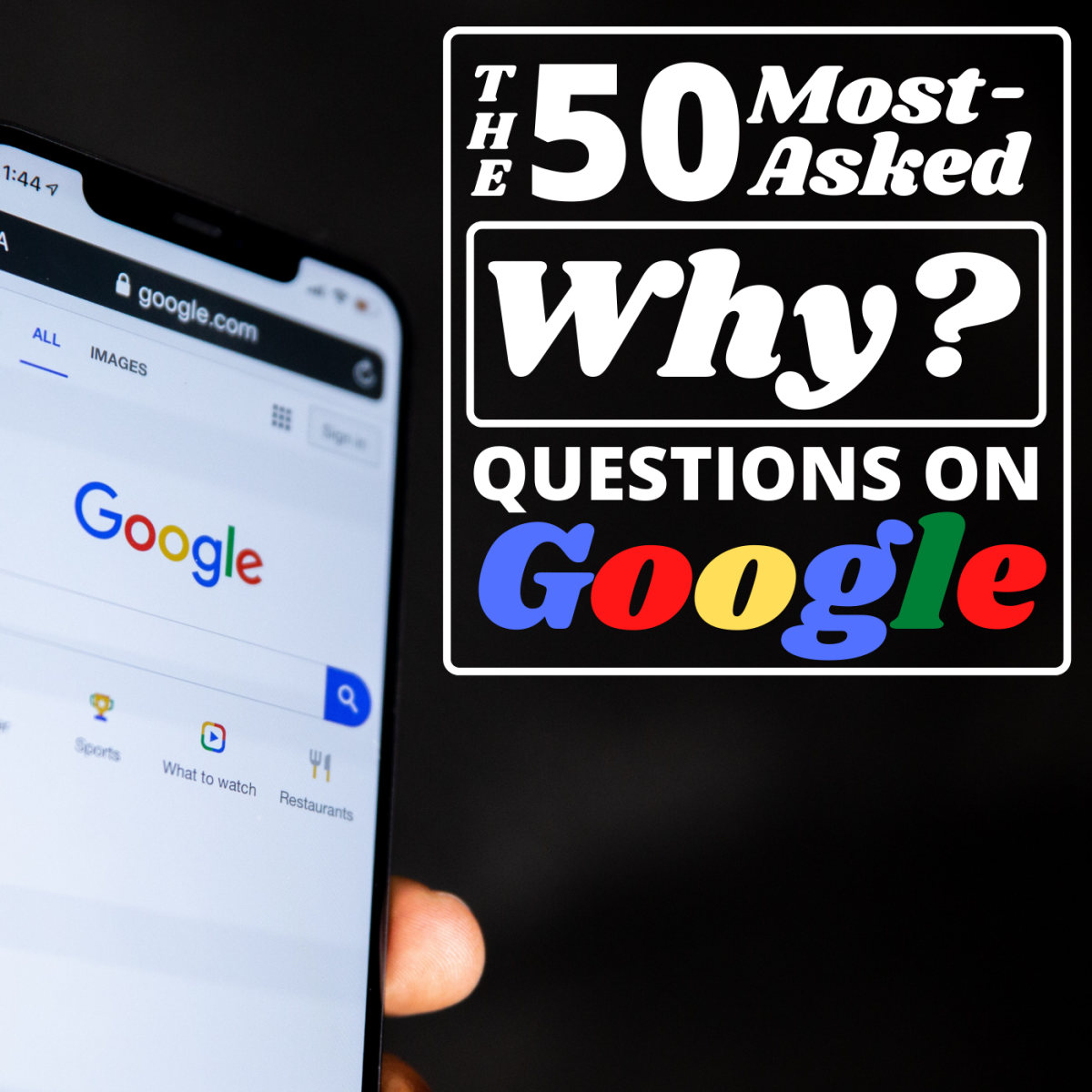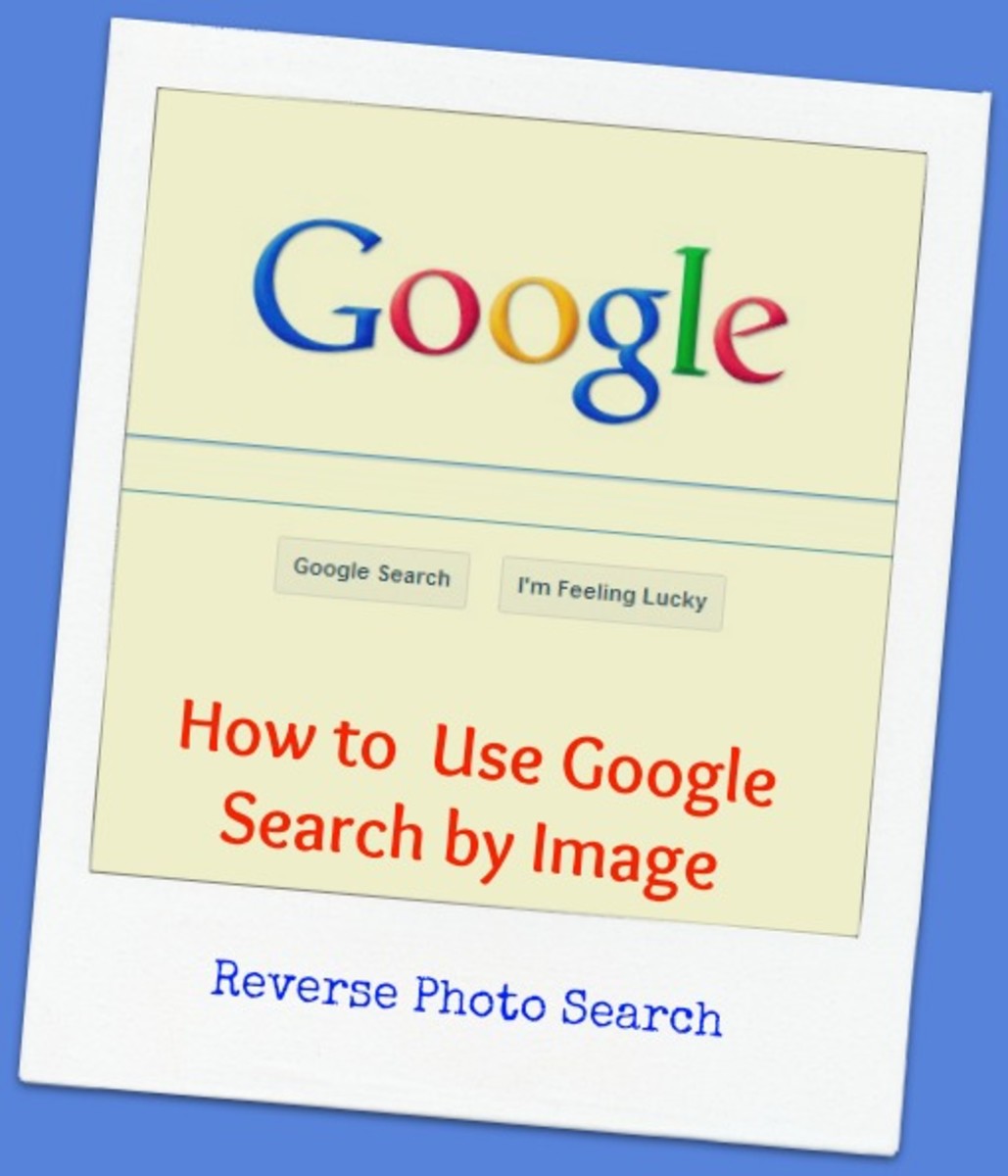Google Advanced Search Features: Expert Level Internet Research

Use Advanced Search Tools to Refine Your Results
Most people searching on the internet simply type a phrase into Google or Bing and see what comes back in the search results. This is often not the most efficient way to find the informaton you are seeking. Search engines offer advanced search options that can improve the search results.

Click on the "Search Tools" option circled in red in the image above to access filter options for your results. Available filters include:
- All results
- Sites with images
- Related searches
- Visited pages
- Not yet visited
- Dictionary
- Reading level
- Personal
- Nearby
- Translated foreign pages
- Verbatim
For example, you can filter to show only search results that include images- and pages with lots of images seem to be at the top of the search results. Another interesting filter is to sort results by reading level. If you are simply searching for a dictionary word definition, you can select the Dictionary filter.
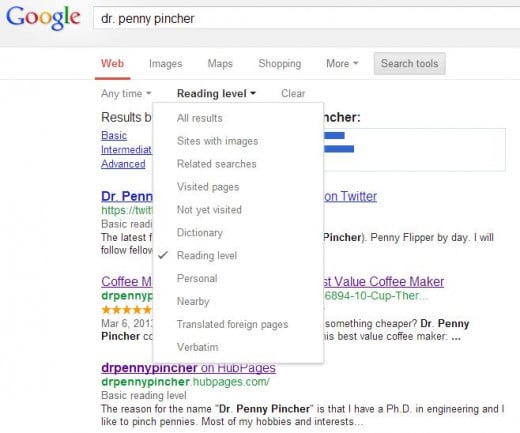
In both Google and Bing, you can apply a time filter to the search results. For example, you can show only results from the past day, past week, past month, etc. This can be useful if you are interested in a current topic. Google also allows you to enter a specific date range to filter your search results.
The time filter is accessed by clicking on the "Any Time" option from the search results page- this will bring up the time filter options.
I think additional filters to select the article depth of facts, short articles/tutorials, or in-depth would be useful. The Dictionary filter is an example of selecting facts vs longer articles.
Search Tools Update- 2015
Google's search tools have been updated as of 2015. Surprisingly there are fewer search options. The picture below shows the menu that now appears.
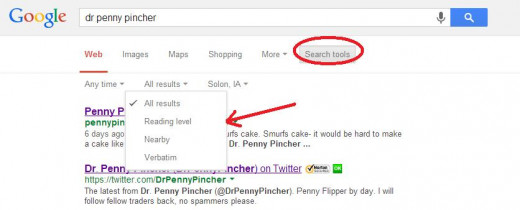
The updated Search Tools include only:
- All results
- Reading level
- Nearby
- Verbatim
The Verbatim option is useful to search for an exact phrase or text string. You can also place text in single quotes when you enter search terms, for example 'keyword stuffing for search engine optimization' would return results for the exact search phrase, whereas without the quotes, you may get results that contain only parts of the search phrase.
It appears through experimentation that you can still get dictionary definitions by simply typing 'dictionary' in front of the word that you are searching.
Looking under the More menu on the search page does give options to select some sources of information, for example you can choose to search Blogs or Recipes as shown in the picture below. The ability to select the source of information is helpful to find the type of search results you are seeking.
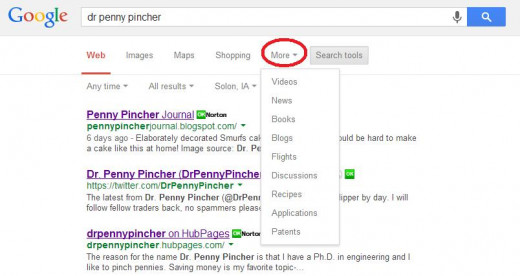
Search Tools will Continue to Evolve
It should be no surprise if search tools continue to change every few months. The key point is to see what options are available besides simply searching for a keyword phrase. There are likely ways to filter your search results in terms of the desired source of information, time of publication of the information, or location cues.
What Kind of Pages are People Looking For?
The current paradigm for search engines is that the user enters search terms and clicks "search". A list of results come back based on matching keywords in the web pages to the keywords in the search. Of course, other factors are applied such as quality filtering- mainly to reduce spam and auto-generated content. The PageRank, a measure of the status and importance of the web page based on which other pages link to it is also a factor in determining the order of the search results presented.
The heavy utilization of keyword matches in selection of search results opens the door for techniques such as keyword stuffing. This is a method of Search Engine Optimization (SEO) that webmasters and bloggers use to get their pages to the top of internet search results. Recent adjustments to Google's algorithms seem to prefer a lower keyword density to select pages for display on the first page of search results. Since content producers are making money from search engine traffic, there is motivation to try to manipulate the search engines to display their pages high in the search results. The search engine designers are constantly trying to balance their search engine algorithms to find high quality results that people want to read.
But this process seems to overlook a basic issue- what depth of information is the searcher seeking? The depth of information that people seek via internet search can be divided into three major categories:
- Facts/Short Answers (1 sentence)
- Brief Articles / Tuitorials
- In-depth Articles (1000 words or more, likely include multiple images)
Facts / Short Articles: For example, you may want to check the spelling of in-depth. Or you may need to find out how many feet are in 1 meter. These are simple facts and can be conveyed most efficiently in a short format. Search engines are good at finding these pages.
Brief Articles / Tutorials: You may be looking for a brief article or simple instructions to answer a question, for example how to make pancakes or how to remove a tick from a dog. Search engines are good at finding this type of article as well.
In-depth Articles: This may fall into the category of research or leisure reading, depending on the situation. You may have trouble deciding exactly what keywords to enter when searching- you are seeking high-quality, useful articles on a topic you are interested in. For example if you just got a Malshi puppy and are interested in learning more about this dog breed in general. You are not looking for step-by-step instructions on housebreaking a Malshi puppy, or where to buy Malshi puppies.
The specific topic is not the key, which makes it difficult to find the right keywords for a search- what you are seeking is interesting, high-quality articles about a fairly general topic. This is the sort of thing that a human expert may have recommended in the past. Now we have search engine results that point us to articles that are stuffed with keywords that reflect our search query...
A Smarter Search Engine?
Even using the advanced search options, I think the main shortcoming of search engines is lack of ability to provide that "expert recommendation". Which articles are the must-read articles if you are interested in a certain topic? Can a search engine possibly figure this out?
There may be statistics about the web pages available to web crawlers that could be used to gauge article depth- word count is an obvious one. The number and perhaps resolution of images on web pages may also be an indication of article depth, depending on the topic. But these metrics do not address "quality". It would be pretty easy to make long articles of low quality- just add more words and pictures that are not relevant.
This is where the human element may be critical in evaluating quality of articles. By recording information about visits to web pages and activity afterward, quality could be judged. How long do visitors spend on the page before moving on? If it is a lousy page, visitors will not stay long. Do visitors "share" the page with others through social networking? These statistics could be used to evaluate quality of articles. I think Google may be heading this direction with recent and planned search engine updates.
Will a search engine ever be able to independently rate the "quality" of articles? I think this is a difficult challenge, since even humans cannot agree on quality of articles. I recently submitted a link to one of my articles on reddit.com: hundreds of people voted it up- and hundreds of people voted it down. It ended up on the controversial page even though it was not intended to be controversial. Search engines may need to watch how people react to articles to determine whether they are high quality and interesting or not. Beauty is in the eye of the beholder, which is ultimately a person, not a search engine.
Search Engine Resources from Amazon
© 2013 Dr Penny Pincher







